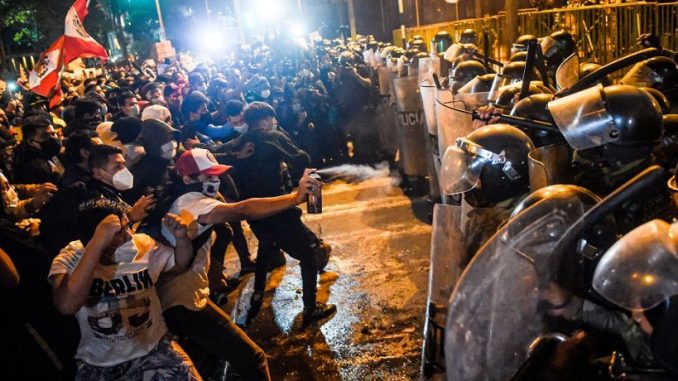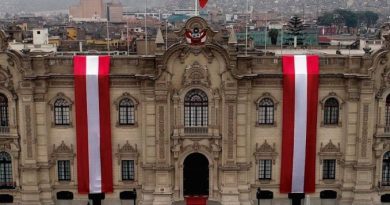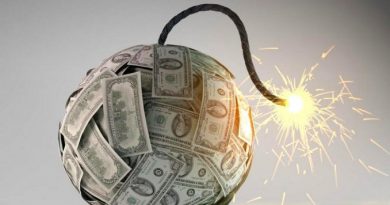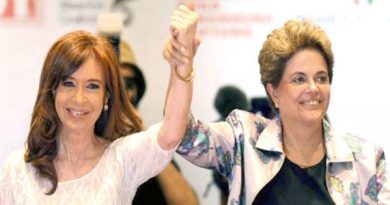Peru: voices of rebellion
We share the interview withFlower Nolasco Pantoja, Coordinator of the NPM Victory Committee (Lima) YToribio Durand, Political analyst and activist of the South Region of the MNP, made by Panorama Internacional, the program of the International Socialist League.
Can you tell us how the political situation in Lima is being lived??

Flower: Good companions, Lima, as a result of the different mobilizations, has reached a high degree of politicization, managing to mobilize the youth sectors, university students and the entire popular sector confronted with the neoliberal policies of the right, the ultra right and the center, peeling them and in their collusion of the CONFIEP and the media that do not bet on structural changes in favor of the ordinary citizen. In the City of Lima, a strong degree of popular resistance can now be shown, changing a climate of insurgency and raising, as main flag, the constituent assembly. Today, 16 of November, elected to the board of directors of Congress, exceeding the 62 votes, headed by Francisco Sagasti, of the purple party that represents interests of the ultra-right, privatistas and coloñistas, and that in turn became the recomposition of neoliberalism in our country.
Why did Merino resign and this crisis in Peru?
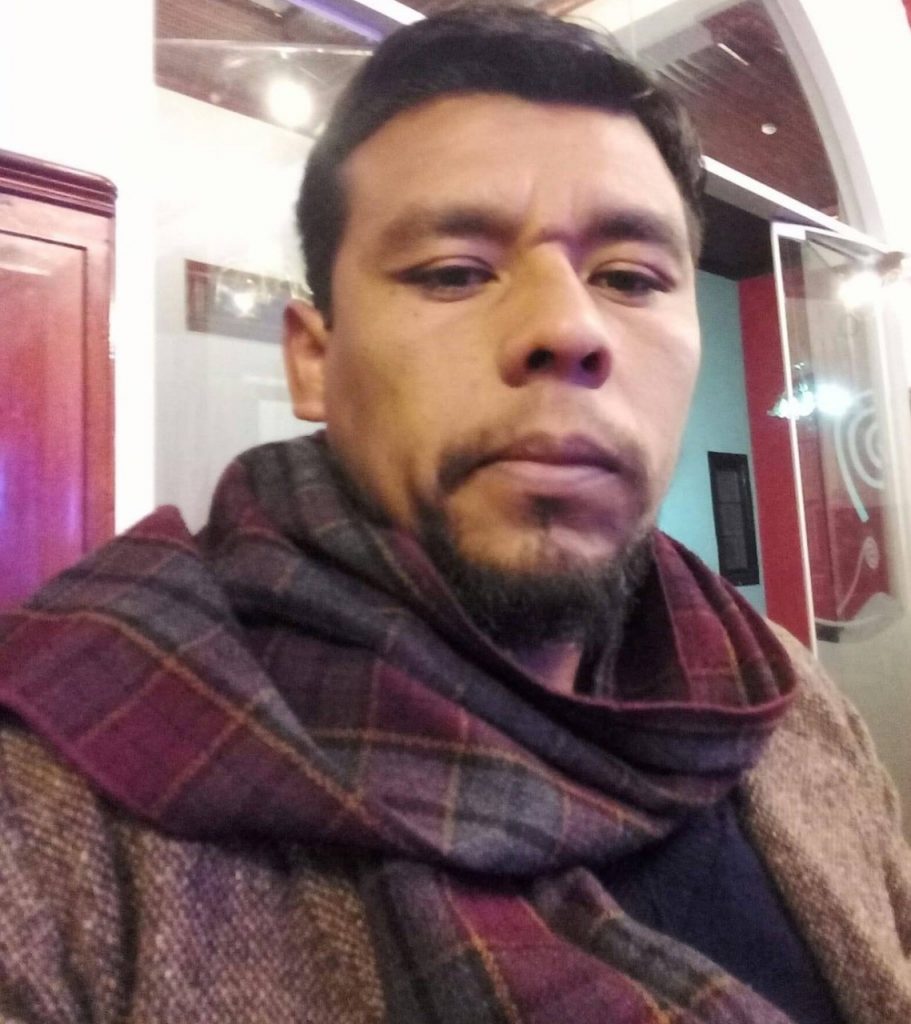
Toribio: This crisis in Peru has been dragging on for years, in addition to the capitalist crisis that is also creating certain internal contradictions, some cracking around the model. We also see the Odebrech corruption issue mounting. The Fujimori Party, the Aprista party, the same ollantism "with the program of the great transformation", end up negotiating for a road map and co-governing with the neoliberal right. In that framework there were already several antecedents, with a PPK government that was elected, but that acts of corruption are also proven to him and he leaves office a year and 8 months of government. PPK is left without a bench and assumes Vizcarra as a son-in-law. New government is formed, right recomposition. We practically see that this crisis made no sense. Merino in a new government under the 26 from January, which is a Congress that calls an extraordinary election with a Fujimori and lobbyist Congress, which was practically closed and the mobilizations in the streets were already shouting: Out with the Congress!!
The struggle occurs as a result of an accumulation of actions and social conflicts, that the right itself is generating, and a dispute between the right about who is the new representative of neo-liberalism, if it's Merino or if it's Congress. But people were no longer happy, there was a very great discontent. And in this framework the resignation of Merino is generated, as a result of several accumulated events throughout this social process.
The mobilizations are being very big: Is the process national? Is youth playing a role in all of this?
Toribio: We see that people are still mobilized in the streets, we're still on the streets across the south, from Tacna, Moquegua, Arequipa, A lots of, Cuzco. The mobilizations in our country are very massive and very large. We have not seen this type of call for years. The university youth sector, workers, the housewives, young people who work, and the entire population has taken to the streets to mobilize to respond to the neo liberal government. They are fed up with this model that has not solved and has not reformed anything that the people want. We are bad in education, bad in housing, people have nowhere to live. We are bad in the health sector, in the labor sector, with a very poor economy. This government was elected because the crisis deepens more, but instead of balancing the crisis deepens, leading us to a breakdown. We can see that the people are still mobilized, still in the streets, and the crisis deepens more.
Youth has played an important role in the fall of the Merino government, the neoliberal government. It has raised the slogan "New Constitution, Constituent Assembly". I think we have a politicized youth, who wants to transform the country from the structures. He no longer wants shape changes, but in the background, changes that reverse the situation in our country. Youth has played an extraordinary role, still in the streets mobilizing. The elections of the 11 April and it won't end there, because people are going to look for changes, mobilizing, shaking the town, lifting the people up and turning their backs to the right, telling him that he no longer represents us and we want a new country and re-found a new homeland on the way to the bicentennial.
Is the repudiation of the old politics widespread? In which social sector does it have more weight?
Flower: The entire Peruvian population has repudiation of the old neoliberal policy, to the constitution of 93 by Fujimori, under which different governments have governed and has served to sustain the model and institutionalized corruption, leading to health prevention failure, collapsed the public health system. That adds to the great shortcomings of other sectors such as education., living place, job stability, the Agriculture, etc. The mobilization is focused on the youth and popular sectors, being massive the calls in the city of Lima.
How do the situation from the capital of the country continue in the next few days?
Flower: Faced with the results of the congress, the right trusted that it would calm the population in the streets, but the population came out forcefully and massively to mobilize. And thus we show that we do not want makeup of the neoliberal model, but if we demand changes to the constitution to re-found Peru. Continuing with the national day of struggle together with the CGTP, we will mobilize in defense of work, health and life, and for popular democracy and the constituent assembly. We workers are called to be part of this struggle, resisting until the caviar and neoliberal right fall..
What is the most likely prospect? Where is the situation going?
Toribio: People are still in the streets, ask for background changes, structural changes, harangue new constitution, constituent Assembly. We see that this government elected by the congress, which is a government of recomposition of the right, it will not live up to what the population demands. Let us bear in mind that in the capital they have died 2 young and there are missing. We see a repressive government that tries to make the protest that is a right of our country disappear.
Faced with all these events, the strategic factor is missing. We see a mobilized left, but not disputing the address. Before a right that is divided and competing among themselves, something strategic has to be born. Why? Because the population looks for great answers to great conflicts.
A while ago the new president has said that he will not call the referendum and there will be no Constituent Assembly. The sea, will govern with the constitution of 93 in this transitional government. So there is no will for change on the part of the right, that he has taken oxygen because he is coming for him 2021 the elections and for him 2022 municipal and regional elections.
We are involved in a process of mobilizations and at the same time an electoral process. Then the people will continue to mobilize, and will continue looking for alternatives for a solution to this crisis that is for a while yet. So we have to start building that strategic factor that allows us to make a massive leap., programmatic, political and strategic at the same time in our country.
We could see that the slogans "Let everyone go" and "New Constitution" are gaining strength. What policy do we revolutionaries have to raise in Peru?
Toribio: The population has discovered something, that the only way to change this corrupt model, institutionalized in the different powers of state, it's the new constitution. The slogan takes more force, something that in Lima we never thought would be shouted, that a constituent assembly was going to be harangued. Now not only the south of the country screams, what is the red south of the country, but now Lima yells, everything at the national level shouts New Constitution and the people ask for New Constitution. I believe this is the way. Apart from the fact that these two slogans are gaining strength, they are transformed into a confrontational action against the neoliberal model.
Now what policy do we revolutionaries have in Peru?, Within this framework, we have now begun to work more strategically. We have to see to strengthen these spaces for mobilization, in order to continue building with a recruitment process. But for that we have to have a much more assertive and much more strategic dialogue, in an international framework that allows us to reinforce the work here in Peru.
We see that here there is a problem of direction, an organizational problem. We see a problem on the left, because they see everything tactical and electoral, they will never capture the strategic issue because the people who are mobilizing right now that we are on the street, you are seeing that the strategic is the right thing to do, that's why ask for background changes. And the new constitution is just that.
We believe that communication must be established to make a 360º turn and convince of the strategic framework of building that organization. There we must bet, we have great failures in Peru with respect to the left, but we have great opportunities within the framework of the Peruvian left.
Mistakes have been made on the left, but I believe that we can begin to build the revolutionary organization that we want so much. There is a very big step, the left has responded very well, has been mobilizing, has participated in the mobilizations, has been articulating. It has come out very well, emerging as an option for him. 2021, I think we are on the right track, But we, within the framework of walking in a much more long-term project, we have been articulating to be able to translate in Lima as we have already reflected in other regions. Now is the time to keep working.
The policy of the revolutionaries is to be able to build strategic power that has direction, organization and program, and in this framework try to start working in a sectorial manner, territorially in all sectors. It is what is lacking here and it is what we must do from an international perspective, to have a clear reading of what is happening here and what has happened in Chile or what has happened in Bolivia in the last elections with the MAS. We have to start now, because if not these marches are going to fall in the air as you can see now. The streets and the mobilizations have expressed that, we have to go to the social movements, neighborhood, groups, but try to unify criteria, we can unify various social sectors.
Are there opportunities to build revolutionary organization in Peru?
Flower: Of course there is partner and we are in the moment to position you. Being objective, of course there are conditions and great opportunities to build the revolutionary organization, taking into account organization, address, program in the strategic and tactical framework in construction; considering that it is important and fundamental to confront and banish the right and capitalism that is committed to the traditional parties of the right and ultra-right, and institutionalized corruption. And so we will capitalize on the great social discontent, transforming it into an alternative for strategic change..
A message for the LIS militancy
Flower: Socialist comrades, fraternal greetings from Peru companions. Within the framework of this struggle in Peru, we can draw great lessons. The communication, International coordination and organization of the LIS is important because we have to continue building on these struggles that the people are leading to confront the model. I call on all the left-wing political forces that make up the LIS to continue strengthening the organizational ties of the popular struggle. Thank you very much partners.
Toribio: I believe that this conflict in our country is in a conflictive situation and a terminal crisis of neoliberalism. The social movement, the youth movement, has started to take the streets by storm and seek democracy in another way, in a way that we've always lifted it up. It is in marches and mobilizations that revolutionary organizations must be built., and there we have to be, and there we are.
I call on all the forces that make up the International Socialist League in which we can unite, we can unify, and within that framework we can further rearm our strategy and our tactics against these nefarious governments, against this neoliberal model, but at the same time seeking unity and strengthening the collective criteria that unify us.
Latin America has to transform itself from the hand of these mobilizations, but something important, we have to start growing, to strengthen us, to unify ourselves within the framework of the fraternity of communication, that can transform a project in Latin America and strengthen each country. I consider that now is the time, a new constitution was raised here in Peru, Chile approved its plebiscite, a great victory against capitalism, in Bolivia he won the MAS, we can see that there is an interesting twist taking place in Latin America. Now the LIS must play a strategic role here in the country and throughout the region, that will give us common sense to continue building a great revolutionary project that we want for all of Latin America.
In Peru we are with a neoliberal government that has negotiated a new deal, They look for who is the best to rebuild, they thought of Merino, Merino did not work, they gave him a coup. Before they had Vizcarra, Vizcarra held out as long as I could hold out, they didn't want Vizcarra either. They are looking for who can represent the model of our country, who guarantees that the model can survive. Right now we see that there is no, he ran out of his representatives, a representative that could be given was Roció Silva who was from the Broad Front, was denied in the first vote, we now see that Francisco Segátis, which is from the party of the purple, enter as a new representative, we see that the media have accepted him as the good candidate who will solve the problem of the crisis. They want to rebuild for him 2021 because there are elections, but the population will continue to mobilize, attentive to the whole process, she will not be an observer, otherwise it will be in the streets, organizing, directed the process for a new constitution, so this gives for even more. In this framework we have to see that strategy plays something important, and we from Peru have been putting together just that and we want to put it together on an international level, to have a much broader approach to Peru, as now we have been discussing it with several colleagues.

